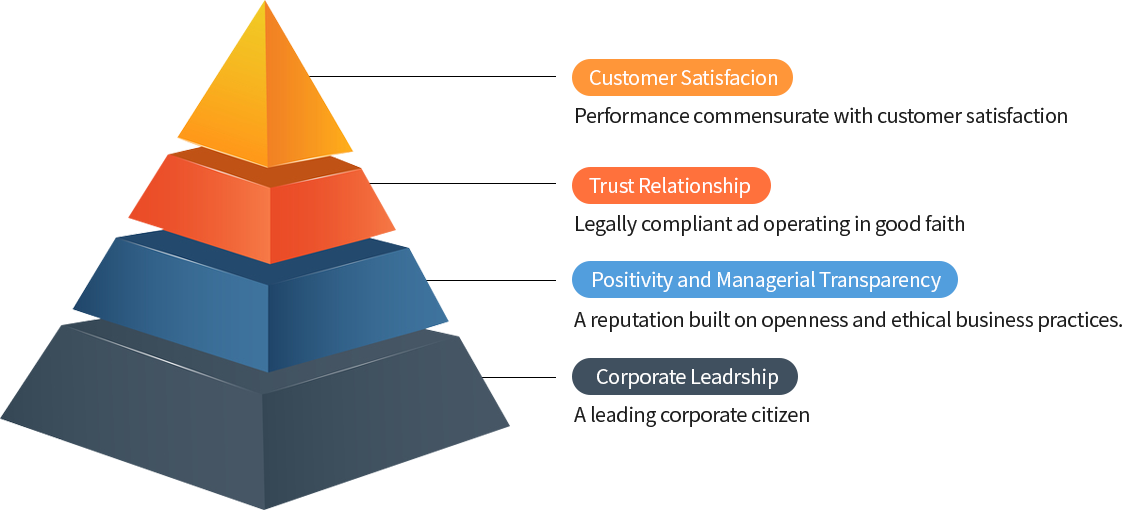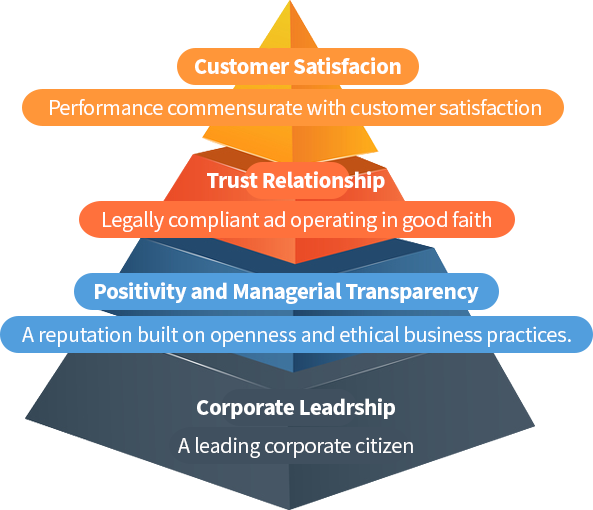-
Article 5 (Purpose)
This guideline sets the permitted behavioral standards and range of allowable benefits such as money and valuables, entertainment, and convenience from interest groups in relation with duty performance of executives and employees for efficient operation of code of ethics.
-
Article 6 (Definition of Terms)
Here are the definitions of terms being used in this guideline
1. Money and Valuables: Economic benefits including money (Cash, gift cards, voucher) and valuables
2. Entertainment: Meal, drinking parties, golf, shows, amusements, and etc.
3. Convenience: Benefits such as transportation, accommodations, tour, activity sponsorships, and etc.
4. Interest Group: All individuals, client companies, and various organizations whose rights or benefits may be directly influenced by one’s performance of duty.
-
Article 7 (Money and Valuables)
1. Executives and employees must not request and receive money and valuables from interest group, but souvenir with company logo of the interest group and souvenir given to all participants of the event held by interest group are exempted.
2. In case one received inevitably received money and valuables without recognizing it, one must return it immediately and report to the department head if returning is difficult.
3. The department head must deal with the reported money and valuables in transparent and proper way and report the result to the audit agency which is in charge of business ethics.
-
Article 8 (Entertainment)
1. One can exchange entertainments in generally accepted level such as having a meal with interest group provided that one must not exchange entertainment in bars with sexual favors.
2. One must not receive any entertainment exceeding generally accepted level; in case one inevitably received it, one must report to the department head.
3. In case one provide entertainment to interest group exceeding generally accepted level with company bearing expenses and in case when one participate in event with entertainment exceeding generally accepted level, one must get approval from department head.
-
Article 9 (Convenience)
1. One must not receive convenience such as transportation, accommodation, and etc. paid by interest group. But convenience provided to all participants of event held by the interest group is exempted.
2. In case one received any convenience exceeding the permitted range, one must report to the department head.
-
Article 10 (Congratulations and Condolences Expenditures)
One must not receive convenience such as transportation, accommodation, and etc. with expenses charged by interest group.
1. One should not inform any family occasions happened to oneself or colleagues to interest group, and informing through third party is considered as one’s notification.
2. In case of informing family occasions to other employees, the range of relatives is limited to grandparents, parents, children of oneself and spouse.
3. The congratulations and condolences expenditures must not exceed generally accepted level in social customs.
4. The principle is to not receive congratulations and condolences expenditures from interest group. But if one inevitably received the expenditures, the expenditures must not exceed generally accepted level in social customs. In case one received expenditure exceeding that level, one must report to the department head and the department head must deposit it to audit agency.
5. When department in charge of business ethics request one to submit return record of expenditures from interest group, one must submit the related records.
-
Article 11 (Lending and Borrowing Money)
1. One must not perform any lending and borrowing money activity such as cash loan, guarantee for loan, lease of real estates, and etc. with interest group.
2. If one inevitably performed money transaction with interest group due to personal acquaintance relationship, one must report to the department head.
-
Article 12 (Event Sponsorship)
1. One must not receive sponsorship from interest group in case of departmental events or club activities supported by company.
2. Receiving benefits such as place, car, and services necessary for the event is considered as receiving supporting donations.
3. In case one inevitably received sponsorship, one must report to head one belongs or to head in charge.
-
Article 13 (Improper Use of Budget Resources)
1. The budget resources of company such as fees for conference and business promotion must not be used for personal uses.
2. Execution of expenses must use corporation card; use of corporation card must comply with the purpose and standard of revenue regulation.
-
Article 14 (Responsibilities of Department Head)
1. Department head must often perform education and counseling to affiliated employees for adequate understanding of this guideline.
2. Department head must take appropriate precautions to prevent affiliated employees to not violate this guideline.
-
Article 15 (Notification Duty and Secret Guarantee)
1. When an executive or employee find out the violation to this guideline, one must notify the audit agency, which is in charge of business ethics, immediately through fastest and most convenient method.
2. When department head is reported of violation of code of ethics by affiliated employee, the department head must fill in the standard form and notify to audit agency which is in charge of business ethics.
3. The department in charge of business ethics may confirm the validity of the notified issue when necessary, and the relevant executive or employee must actively cooperate.
4. Executives and employees must not give disadvantages to the reporter and must not reveal the identity.
5. If there is possibility that reporter may receive disadvantage in terms of human resources affairs, personnel transfer must be made in accordance with one’s wishes.
6. In case executive or employee finds the fact of report from duty or accident, the executive or employee must keep the secret and may receive disciplinary action in case of leakage.
-
Article 16 (Rewards and Disciplinary Actions)
1. The company may provide executive or employee, with meritorious contribution in accomplishment of the purpose of this guideline, an appropriate compensation or reward in accordance with relevant regulations.
2. The company will strictly censure any executive or employee violating this guideline in accordance with relevant regulations.
-
Article 17 (Prohibition of Retaliatory Act)
Contractor do not perform any retaliatory act giving disadvantage, severance of business, and irrational restriction to subcontractor for the reason of formal objection to contents of contract, consultation of quarrel adjustment related with subcontract transaction, and report of unfair trade of contractor.
-
Article 18 (Examination Process)
In case visiting supplier is necessary, visit schedule must be noticed in forms of written document or electronic document before the visit.
-
Article 19 (Interpretation)
1. In case the family, relatives, and friends of executive and employee illegally use the name of executive or employee to violate this guidance, it is considered as action of person as well.
2. In case question arises on parts not specifically defined in this guideline and code of ethics, the one must make inquiry to the department in charge of business ethics and follow the interpretation.
-
-Supplementary provision
This regulation is enacted for practice starting from July 1th 2013.



 ’s activities.
’s activities.

